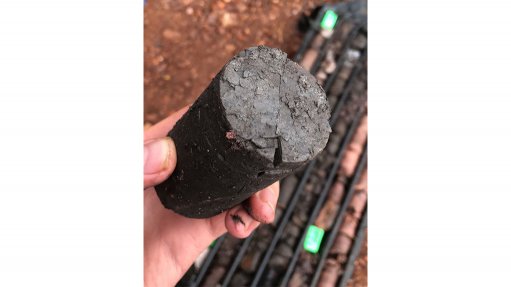
K.HILL MANGANESE CORE SAMPLE The K.Hill mine site has had exploration success
Battery metal development company Giyani Metals aims to have the feasibility study for its K.Hill project, located near the town of Kanye, in Botswana, completed in the third quarter of this year.
Following the completion of the study, the TSX-V-listed company will begin development on its demonstration plant.
The K.Hill project entails a manganese openpit mine, and a beneficiation facility where the manganese will be processed into high-purity manganese sulfate – a product used in the manufacture of lithium-ion batteries – for shipment to customers in North America, Europe and Asia.
The mine site has had exploration success, with the company having taken the resource from under two-million tons to more than five-million tons in inferred and indicated resources.
Therefore, the life-of-mine has been extended to the point where the company has started to consider its potential for increasing production capacity, says Giyani Metals business development VP George Donne.
He elaborates that, upon completion, customers will be able to visit the site and beneficiation plants, as well as engage with local communities and government representatives at the location.
Moreover, Donne points out that, for the Botswana mining industry, the project serves as a move towards increasing final product beneficiation, which the Botswana government is keen to promote.
While the country has a long mining legacy, most products are intermediate in nature or concentrates that are then shipped for high-value refining elsewhere.
Giyani Metals is the first mining company to beneficiate metal in-country.
Donne explains that the company’s ambition is to be a major producer of a critical raw material in a responsible and sustainable fashion for the electric vehicle (EV) revolution.
The K.Hill project’s processing plant will be producing about 100 000 t to 120 000 t of high-purity manganese sulfate a year.
Giyani Metals is also developing other projects, the Otse and Lobatse projects, which will feed into the K.Hill plant.
Following the completion of the demonstration plant, Giyani Metals will be able to produce test samples of its material to send to customers in the EV battery sector next year, thereby ensuring that it is eligible for customers’ pre-qualification procurement.
“The demand for battery-grade manganese is set to increase anywhere between ten to 15 times over the next decade. Currently, there aren’t enough producers or beneficiation facilities globally to feed that demand.”
Otse and Lobatse Projects
The Otse project is Giyani Metals’ secondary project, located about 50 km from K.Hill, which means it will have relatively easy access to the K.Hill beneficiation facility.
The deposit on site is high-grade, supergene podiform manganese oxide mineralisation.
Giyani Metals is eager to progress the development, as the site’s potential should result in positive outcomes in terms of value and plant efficiency, says Donne.
The company has completed exploration drilling at Otse and is finalising drill sampling.
“We’re hoping that, later this year, we'll have a maiden resource for that particular deposit,” says Donne.
Meanwhile, surveying has been done on the Lobatse project, located close to the Botswana–South Africa border, but no further work has been done on site.
Sustainability and ESG
Donne says important elements in Giyani Metals’ projects are their sustainability, and performance when considering environmental, social and governance (ESG) factors.
Sustainability and adherence to ESG guidelines play an important role in securing partnerships and agreements with EV manufacturers because they are becoming heavily regulated, owing to their buying materials directly from miners.
“Manufacturers are now essentially charged with being good custodians of established human rights and environmental policies, given their role in the global supply chain.
“They are concerned about conditions within the mines, the environmental practices of their raw material providers and the human rights of those impacted on by the entire operation,” adds Donne.
He credits Giyani Metals’ ensuring that it can be a completely traceable source of manganese to Botswana’s stable jurisdiction and assistance from high levels of governance.
The company prioritises the best appropriate practices for ESG compliance, in addition to strong support from the local administration for its operations.
“Something that any company looking to come into the sector must consider is that sustainability is just as important as quality when it comes to the offtake market. It is not only what you mine but rather how you mine that is going to be a significant consideration for all mining companies going forward,” he concludes.